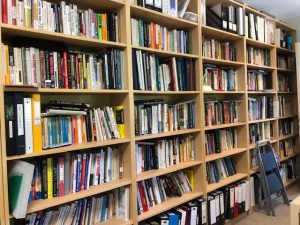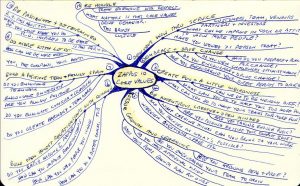I read a lot of books but that wasn’t always the case. I got interested in reading when I had to at graduate school but what really got me into them was the realization that there is so much you can learn that is incredibly valuable in life and in business and all you need to do to take advantage of that is invest a small amount of money and a small amount of time.
I was recently asked how I manage to read a book a week and sometimes more. Well first up what you find with reading is with practice you learn to read pretty fast because the more you read the more you’ll train your brain to scan text rather than labouring over every word. The physiological reason for this is your brain is always looking for ways to conserve energy but the practical result is you get the message fast.
However it’s not just about reading fats. It’s also about reading smart. Smart reading involves x “tricks”
First, I read the front matter – the Preface, Introduction, and/or Foreword. The Foreword is usually written by a “friend” of the author who will tend to say nice things so if time is critical you could probably skip that for now. However, the Preface and/or Introduction are intended to put the content of the book into context so they should give you an idea of what the book is about. If you resonate with the author’s style and the content appears to be interesting then go to 2. The author’s style is very important to me and even more important than what the content promises – I find some writing very easy and enjoyable to read but if I have to struggle I will not keep going with it which means I might miss out on some good ideas but at least I won’t suffer. I have found that for the most part authors who don’t write well don’t have much to say anyway. I call this the “readability test.”
Next, after reading the front matter I go to the last chapter and read the conclusion to see if this tweaks my interest. I apply the readability test to the last Chapter and if it does interest me I then go to Chapter 1 and again apply the readability test. Sometimes a book will not have a concluding chapter (as opposed to the final chapter) that pulls everything together. In that case you have to form a view about the book from the first chapter but I would still read the last chapter as part of my readability test if you struggle with it the rest of the book isn’t going to be any better.
Sometimes I find I’ve got all I want or need from those 2 chapters which usually means the book was probably not worth putting any more time into. Some people might think I’ve wasted money on the book if I only read a couple of sections. I see it as placing a bet on being able to get some value from a book but if it doesn’t look like that happening I’ll save valuable time by setting it aside. On balance, my library has been invaluable to me.
Thirdly, when I read the book I’ll tend to skim. This means I fly through pages looking for key words and phrases. This gives me an opportunity to very quickly get a sense of what’s being discussed and when I come across something I need to think about I stop and read carefully.
Finally, I hate the thought of letting a good idea escape so I don’t mind placing bets like this but I also rely heavily on reviews by other people or referrals from friends who share my love of reading. This dramatically reduces the risk of placing a bad bet. Often you can get book summaries (sometimes free of very inexpensive) that give you a good idea of what a book is about.
In keeping with not allowing a good idea to get away I will always read a book with my journal and pen at hand and most certainly a highlighter. I write note in my journal and sometimes I’ll mindmap the book (or a key section of it) as well as taking notes. This is what one of my mindmaps looks like.
When I read on my Kindle (or the Kindle App on my iPad and iPhone – you don’t need to buy a Kindle because apps are available for iOS and Android) I use the highlighting and commenting extensively. BTW Kindle is NOT my favorite medium. I much prefer paper & ink but because I travel a lot my Kindle is always with me and books that I really like and which I may refer to again are typically on my Kindle and my bookshelf.
If you really struggle with reading you might also be able to buy an audio version of the book. This is good when you’re in a car a lot in that it enable you to turn the vehicle into a classroom but it’s easy for your mind to wander when listening so you can miss critical ideas. Moreover, it’s really hard to go back and find the place where something profound was discussed.
For some of its titles, allows you to buy an audio version at a pretty low price that installs with your Kindle book and you can read the book and listen at the same time. It’s very cleaver.
I need to finish this post with a final piece of advice.
Sometimes you’ll find a book just doesn’t do it for you. Usually the readability test is strong confirmation that you and the book are not a good fit. However that’s not always the case. For example, when Stephen Covey’s 7 Habits was first published in 1989 I, like millions of other people, bought it but at the time my head-space was somewhere that did not allow me to resonate with it. All I was interested in was the 3rd Habit that related (I thought) to time management – actually I later discovered that he was actually advocating life management not simply time management which is was an important revelation for me and millions of other people.
But getting back on point, I did not read the whole book until several years after it was first published. When I did get around to reading it my mind was totally ready for his message and wow it sure did resonate. I consider it to be THE most important book I have ever read and I have read it at least 10 times and every time I take something new from it. It’s not just a formula for living a more effective life, it’s a formula for creating and running a more effective business.
And here’s another interesting point. After reading the 7 Habits and loving it I was not ready to read the 8th Habit when it first came out. But several years latter I discovered how profoundly important the message in that book is. What I’m saying here is that (1) you need to be ready to take ideas on board, and (2) a book that might not appeal to you initially might be incredibly useful at a later point in time as long as it passes the readability test which, in the case of Covey’s writing, all his books do.
